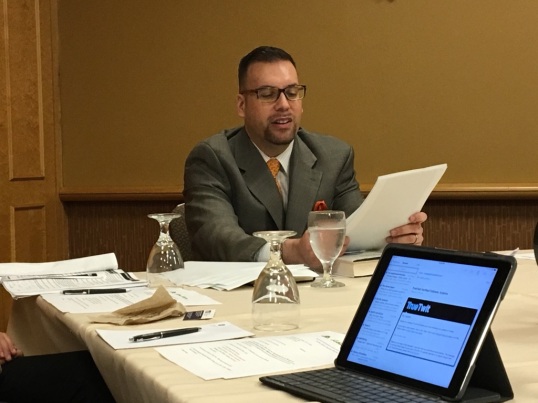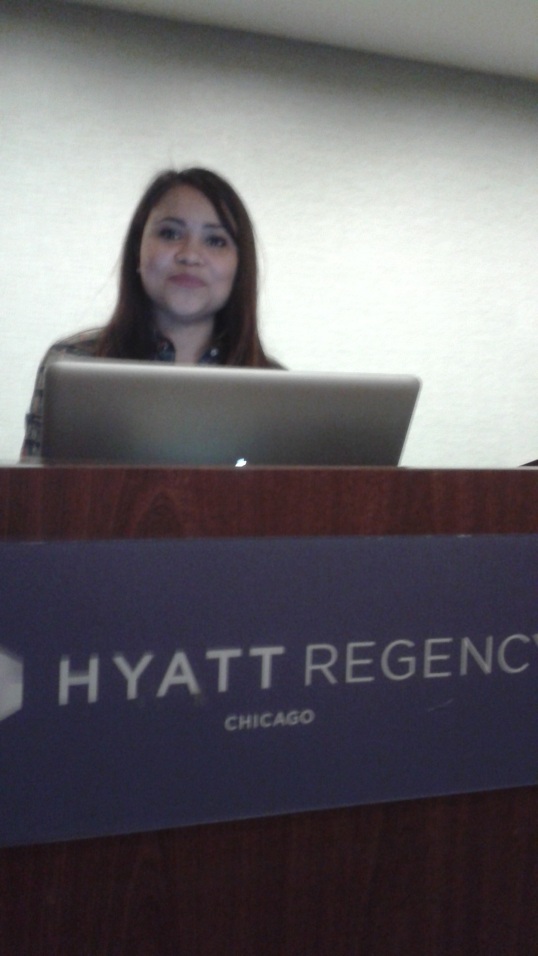I was walking home from the Hyatt after the conference ended and an AALL member stopped me on Michigan Ave. to tell me how much she loved Chicago. That made my day. I sent colleagues all over the city during the conference—to the Chicago History Museum, Wicker Park, Old Town, the CAF boat tour dock, the West Loop, and to Eataly (they owe me a huge cut). Throughout all of this, I was supposed to be writing up reports of various programs/meetings, and I got a little behind. The following are short summaries of several events from Sunday, July 17:
Latino Caucus: My DePaul law school classmate, Matt Katz, gave a compelling and provocative presentation that focused on the precarious and truly abominable state of immigration law in this country, providing specific case examples from his firm (Katz Law). Mateo also berated the increasing trend of prison privatization in the U.S., mentioning a 2013 article in The Guardian, “America’s Private Prison System is a National Disgrace.” To drive his points home, Matt drew upon a wide range of authors, including French philosopher Michel Foucault. Matt distributed copies of a piece he recently penned, “Como Indocumentado, Que Debo Saber y Hacer en la Era del Trump y la Negación de DAPA por La Corte Suprema?” (As an undocumented immigrant, what should I know and do in the era of Trump and the Supreme Court’s rejection of DAPA?).
After Mateo’s talk, the Latino Caucus began its business meeting, led by Chair Marisol Florén-Romero (Florida International U). The Caucus discussed a number of proposed projects, including one called “Latino Voices.” The goal of this initiative would be to compile information on selected members of the Hispanic legal community, including law librarians. These personal profiles would be featured on the Caucus’ web page.

Matt Katz
Asian Legal Information in English: Availability, Accessibility, and Quality Control: This was a very interesting and useful program; kudos to all the presenters who covered China (Alex Zhang, U of Michigan), Hong Kong/Macao (Anne Mostad-Jensen, U of North Dakota), South Korea (Juice Lee, Northeastern), and Japan (Mike McArthur, U of Michigan). The presenters did an excellent job of explaining the complexities involved in translating the law from these jurisdictions and the inherent pitfalls of English-language translations. Free websites and commercial databases were presented, and in some instances demoed live. Juice Lee’s PowerPoint slides are posted on AALL’s website.
Foreign Law Selectors Interest Group: The meeting drew about 30 attendees, and was led by Marci Hoffman (UC Berkeley). Schaffer Grant recipient Rheny Pulungan of the University of Melbourne’s Law School Library offered a brief overview of her library’s print and electronic resources, which she described in more detail during her presentation on Monday, July 18 (summary forthcoming). Representatives from the Law Library of Congress, Yale, Harvard, NEFLLCG, and LLMC Digital provided updates. The LA Law Library was not represented, as Neel Agrawal has left his position there. Marci also brought the group up to date on recent developments related to the Foreign Law Guide (FLG) and Index to Foreign Legal Periodicals (IFLP). Regarding the former, there are newly-updated entries for Azerbaijan, China, France, Japan, and Mexico. Updates for Germany, South Korea, and Switzerland have been completed and will be loaded soon; revisions for Argentina, Chile, Italy, and Spain are in the works. She also indicated that the IFLP will soon have a multilingual subject thesaurus and that the database will be adding 10 new Japanese journals. Marci will post the full minutes of the meeting on the Foreign Law Selectors Interest Group web page.

Rheny Pulangan
Before closing, I want to say just a bit about the convention center’s DuSable room, which apparently piqued the interest of a few FCIL-SIS members. I’m quite sure the room is named for Jean Baptiste Point DuSable who is known as the founder of Chicago. DuSable was purportedly a Haitian of African and French descent who established the first permanent settlement here in the 1780s. Next time you’re in town, check out the DuSable Museum of African American History in Chicago’s Hyde Park neighborhood.
